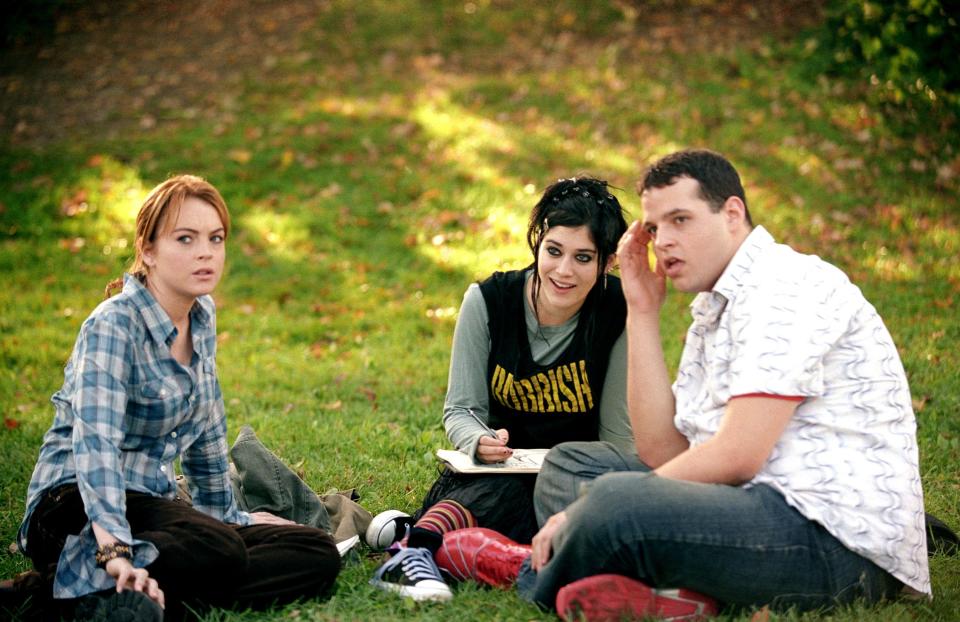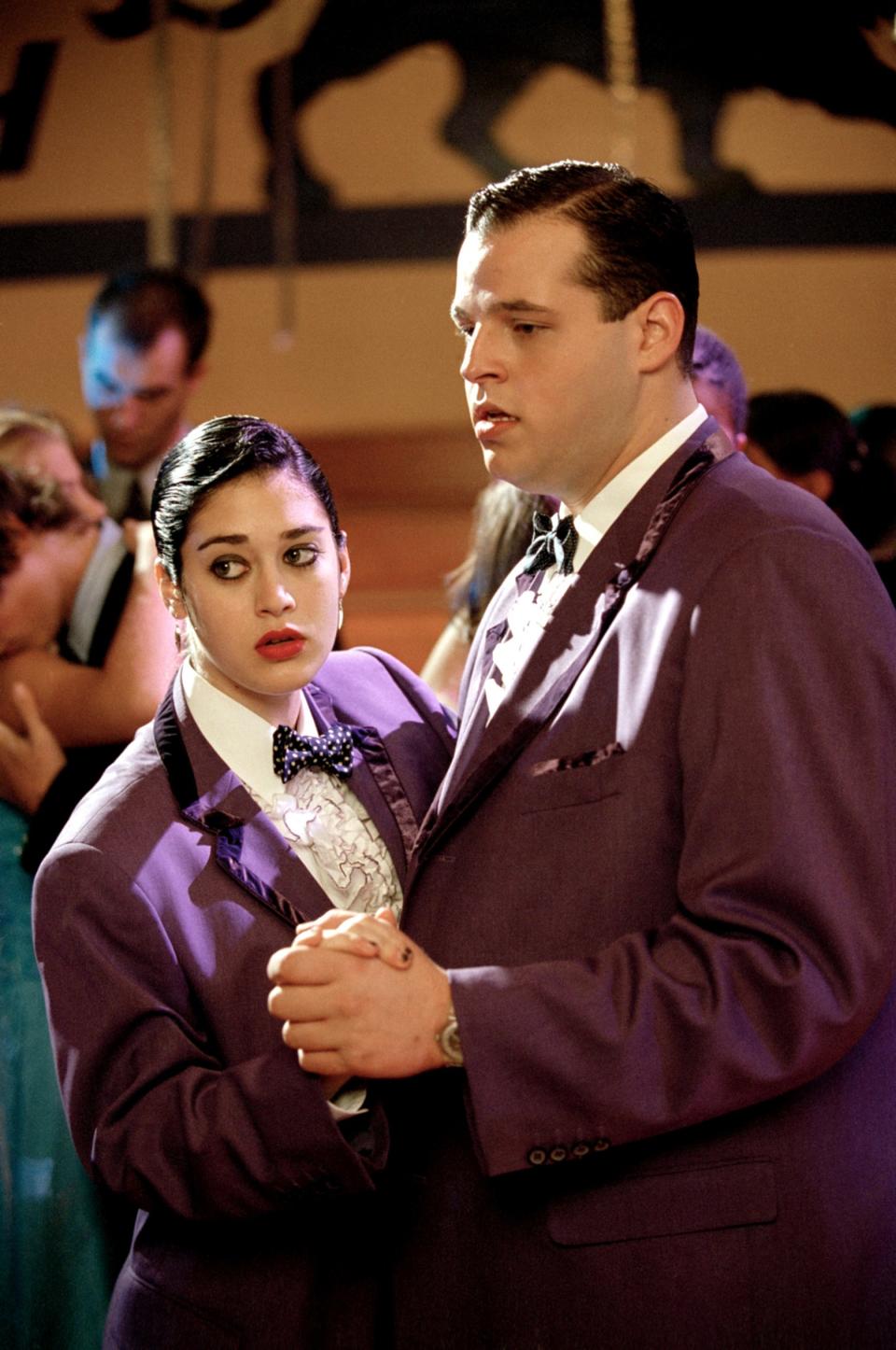"Mean Girls" Actor Daniel Franzese on Where Damian Would Be Today and the Legacy of the Gay Teen
Fifteen years after Mean Girls first premiered in theaters, the teen movie is still making an impact on today’s pop culture. People still quote it constantly. Ariana Grande uses the film as creative inspiration. There’s even a hit Broadway musical. And in addition to the endless memes and still-relevant disses, there’s a cast of characters that are just as compelling today as they were in 2004. Among them is Damian Leigh (played by Daniel Franzese), who might’ve been “too gay to function” in some students’ eyes at North Shore High School, but whose one-liners (“She doesn’t even go here!”) and unabashed confidence have solidified him as one of the most iconic queer characters in movie history.
Since Mean Girls, Daniel has continued to build a career in acting and comedy, with a slew of television roles, including playing Eddie in the critically-acclaimed series Looking. This year, he’s been busy touring the country on his "Yass! You're Amazing!" stand-up tour. Now performing in cities all over, he’s found inspiration for his comedy from his own mother, spreading awareness about sex education, his own activism, and more. His Mean Girls character has undoubtedly helped plenty of other queer youth figuring out who they are, but Daniel has also found himself actively helping change the world through policy.
In light of the 15th anniversary of Mean Girls, Daniel stopped by Teen Vogue to chat about Damian’s legacy, lobbying, Lindsay Lohan Beach Club, and more.
Teen Vogue: Do you still get a lot of Mean Girls fans at your comedy shows?
Daniel Franzese: They come through, definitely. I have all types of people come. I always ask the audience, "Who’s Italian? Who's LGBTQ? Who's a weirdo? Who's a Mean Girls fan?" And that's pretty much my entire fan base, so I'm just trying to check everybody out and see what's going on. But I have a really widespread fan base. I have 60-year-old Italian ladies, and 14-year-old girls mixed in with the gays, and so it makes a really eclectic room. I call my fans "The House of Glenn Coco" because I think anybody is welcome if you think you can feel like Glenn Coco for a day, then come join us.
TV: With something as seminal to our pop culture as Mean Girls, fans can blur the lines and believe that you’re that character. How do you navigate that separation of who you are and who Damian is?
DF: Well to me, Damian was a little bit of revisionist history of my own life. I had a very hard time being sixteen and closeted, trying to figure out what was going on with me. In my early twenties, I checked myself into conversion therapy, and so I had this experience that was very different than what a teen might experience today, although there still are teens going through that. So Damian for me, even though I was in the closet, it was very cathartic to be able to go and live my sixteen-year-old life comfortably. One of the remarkable things about that character is that he never fears for his life in his whole arc. Like he can just live in the movie without ever having to duck and feel like he's going to get hit on the back of the head, and I don't think I had an experience like that. I think that a lot of people saw that was possible in Damian.
When we had the tenth anniversary, I got a letter from a fan that said, "I don't know if you're gay or not, and it doesn't really matter," I thought, "Oh, it totally matters," and then he said, "Well, when I was in eighth grade, I got beat up for being chubby and tortured for being a sissy, and then your movie came out, and in ninth grade, on the first day of school, the popular girls were like, 'You're like Damian. Come sit with us,'" and he was like, "Thank you so much for giving me an identity that I can relate to," and that's when I came out. I wrote a letter to Damian that went viral because it was an opportunity for me to just thank the character and thank the experience for coming full circle for me and letting me feel comfortable with myself through my fans learning how to be comfortable through my character. Super meta.

MEAN GIRLS, Lindsay Lohan, Lizzy Caplan, Daniel Franzese, 2004, (c) Paramount/courtesy Everett Colle
Courtesy Everett CollectionTV: This year marks the 15th anniversary. But every year people are posting on social media about Mean Girls. What’s it like having that annual celebration?
DF: What's actually interesting is it's a day that everyone reflects back on this pillar of my career, you know? And I think that that's really fun because of all the stuff that I've accomplished since then, all the things that I'm planning on doing, it's nice to go back and be like, "This will be around after me." It's nice to know that eventually when the apocalypse happens, there will be a copy of Mean Girls somewhere.
TV: So fifteen years in the future, where do you think Damian would be in this world?
DF: That's funny. I definitely think he would be a creative. I think Damian and Janis had it figured out that high school wasn't the end of the world, that it was just not even the beginning yet. So they'd just kind of stay there, take their time to get through it, and then after college could explore and find out what they would be. Damian Holbrook, the actual Damian who Tina based [the character] on, is a writer at TV Guide. I don't think that that's too far off from where Damian in the movie would've ended up. I would like to see Damian be a writer at TV Guide.
TV: I have to ask since it was part of the zeitgeist this year: Did you watch any of Lindsay Lohan’s Beach Club?
DF: I watched a little bit of it. I'd rather be there than watch that show. I love Lindsay, and I'm so happy for her that she's finding this new club mogul status, but I definitely would rather be partying in Mykonos than watching the show.
TV: You also have spent some time lobbying in Washington, D.C. What’s that been like?
DF: I work for a lot of organizations, primarily the Elizabeth Taylor Aids Foundation. I'm an ambassador for them and I speak on LGBTQ homeless youth prevention and treatment, and I also speak upon comprehensive sexual education for minors. Especially in our southern states, a lot of people are focused on abstinence training or anti-drug training instead of recovery and sexual education, so it's a very important thing right now in our country. I mean there's young people who don't even know what HIV is, and that's just so alarming to me. So, I do what I can.
I didn't realize how easy it was to be able to go speak to Congress, like you can just go and sign up and make an appointment and actually go sit down with your Congressmen or women and talk to them in a invoke change, and then you can go check up with them and make sure that the things that you asked are deliverable. They didn't make it seem like it was that easy, but now I see that, and I'm very inspired by a lot of our LGBT Congresspeople, like how Jared Polis now is governor of Colorado, and it's just so inspiring to see how far we can climb now. But now that we have broken that ceiling, we need to continue to inspire more queer youth to run for office.

MEAN GIRLS, Lizzy Caplan, Daniel Franzese, 2004, (c) Paramount/courtesy Everett Collection
Courtesy Everett CollectionTV: Would you ever run for office?
DF: Potentially. I don't see why not. I think one of the things that a lot of LGBT people say to me is, "Well, girl, I have a checkered past," you know? But we've been listening to a bunch of people who pretended like they haven't had checkered pasts for many many years. It's time for people who aren't embarrassed of who they are to step forward and put themselves out there.
__TV: You brought up education about HIV for young people. What’s really wild is that a lot of young people don’t know about the history of the HIV/AIDS epidemic in the ‘80s. How do we help change that? __
DF: If you don't know your history, you're doomed to repeat it, and it's unfortunate. So I think it's just conversations, and it transcends HIV. It has to do with many other things. I think that our queer youth right now, this new generation is so queer, and it's so exciting to see. But I feel like a lot of them don't know the shoulders that they stand on of all their queer ancestors before them that lived both silently open and loudly open in the past.
TV: Is there anything else you’ve been working on?
DF: I do work with Lonely Whale, the plastic straw initiative, and single use plastic. We just asked Unicode to remove plastic straws from the emojis, which is kind of funny. But I think the next big thing too is going to be glitter. We're going to have to start getting glitter out of the world. It's ruining the planet, literally.
Related: This Classic Regina George Line Was Cut From Ariana Grande's "Thank U, Next" Video

